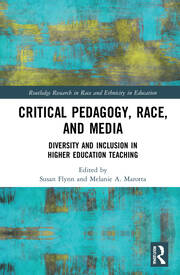1st Edition
Critical Pedagogy, Race, and Media Diversity and Inclusion in Higher Education Teaching
Critical Pedagogy, Race, and Media investigates how popular media offers the potential to radicalise what and how we teach for inclusivity. Bringing together established scholars in the areas of race and pedagogy, this collection offers a unique approach to critical pedagogy by analysing current and historical iterations of race onscreen.
The book forms theoretical and methodological bridges between the disciplinary fields of pedagogy, equality studies, and screen studies to explore how we might engage in and critique screen culture for teaching about race. It employs Critical Race Theory and paradigmatic frameworks to address some of the social crises in Higher Education classrooms, forging new understandings of how notions of race are buttressed by popular media. The chapters draw on popular media as a tool to explore the social, economic, and cultural dimensions of racial injustice and are grouped by Black studies, migration studies, Indigenous studies, Latinx studies, and Asian studies. Each chapter addresses diversity and the necessity for teaching to include visual media which is reflective of a myriad of students’ experiences.
Offering opportunities for using popular media to teach for inclusion in Higher Education, this critical and timely book will be highly relevant for academics, scholars, and students across interdisciplinary fields such as pedagogy, human geography, sociology, cultural studies, media studies, and equality studies.
List of Figures
List of Contributors
Foreword
Jessica Berman
Acknowledgements
Introduction: Critical pedagogy, race, and media
Susan Flynn and Melanie A. Marotta
- Teaching Race in Film: Exploring Birth of a Nation and Django Unchained
- Narratives of Institutional Racism and Social Critique in Contemporary UK Television Drama
- Digital and Decolonial Diffractions of Race and Materiality for (Post)Pandemic Education
- Teaching an Inclusive English Composition Course: The Vampire Genre
- Refugee 2.0 - (De)constructing race, ethnicity, and identity through digital practices in refugees in camp settings and in-between places
- Countervisual analysis of migrants’ self-representational strategies in contemporary media: A pedagogical and psychological perspective
- Playing Difference: Towards a Games of Colour Pedagogy
- Reading and Writing to Reclaim Humanity: Centering the Ongoing History of Asian Exclusion in America in the (Digital) Age of Covid-19
- Whose Bollywood is this anyway?: Exploring Critical Frameworks for Studying Popular Hindi Cinema
- Tribal Ways: How to Teach Indigenous Studies without Textbooks
- Colour-Blindness and Neoliberalism in Disney’s Pocahontas
- Beyond the Burial Ground: Reflecting on Indigenous Representation in 1970s and 1980s American Horror
- Gaming from the margins: Indigenous representation, critical gaming, and pedagogy
- Questioning the Drug War Frame: Teaching Mexico’s Violence through Documentary Representations of Race
- "Chicken Noodle Soup" with Some Theory on the Side
Jonathan Wright
Teresa Forde
Annouchka Bayley
Melanie A. Marotta
Claudia Böhme
Boris Ruzic
Edmond Y. Chang, Kishonna L. Gray and Ashlee Bird
Kathleen Tamayo Alves
Shweta Rao Garg
Brian Wright-McLeod
Brennan Thomas
Lisa Ellen Williams
Wendi Sierra
David Shames
Kristen Lillvis and Ivy Scoville
Biography
Susan Flynn is a Lecturer at Waterford Institute of Technology. Her research focuses on pedagogy, equality, diversity, inclusion, popular culture and digital technologies.
Melanie A. Marotta is a Lecturer in the Department of English and Language Arts at Morgan State University, USA. Her research focuses on Science Fiction, Young Adult, the American West, American Literature (in particular African American literature), and Ecocriticism.
"Unlike previous periods in human history, as a result of unpresented technological advances in production and distribution, information is available in abundance. But there is a big distinction between ‘information’, ‘knowledge’ and ‘learning’ and if there ever was a need for a book that enables us to navigate the expansive landscape of media, specifically in relation to questions of ‘race’ and education, then this is the one."
Dr Gurnam Singh, Associate Professor of Equity, Coventry University and Visiting Fellow in Race and Education, University of the Arts, London, UK.




